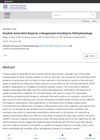 August 2024 in “Frontiers in Nutrition”
August 2024 in “Frontiers in Nutrition” Antioxidant-rich diets may reduce hair loss risk, while pro-inflammatory diets may increase it, especially in women.
 16 citations,
February 2019 in “Pediatric Blood & Cancer”
16 citations,
February 2019 in “Pediatric Blood & Cancer” Most children with CNS tumors on targeted therapy had skin reactions, which were generally treatable without stopping the therapy.
160 citations,
April 2014 in “Drug discovery today” Melatonin helps regulate sleep and may aid in treating various health issues.
 January 2020 in “Asian Journal of Basic Science & Research”
January 2020 in “Asian Journal of Basic Science & Research” Nutrease powder, a high-protein, low-carb supplement, can help manage Polycystic Ovary Syndrome symptoms, regulate periods, improve ovulation, and restore fertility.
 37 citations,
June 2018 in “Clinical and Experimental Medicine”
37 citations,
June 2018 in “Clinical and Experimental Medicine” People with alopecia areata often have lower vitamin D levels and more inflammation, suggesting vitamin D might be involved in the condition.
 October 2023 in “International journal of biology, pharmacy and allied sciences”
October 2023 in “International journal of biology, pharmacy and allied sciences” Personalized treatment plans combining natural and synthetic approaches are important for managing alopecia effectively.
 April 2022 in “Research Square (Research Square)”
April 2022 in “Research Square (Research Square)” The combination of laser and topical steroids is more effective for treating alopecia areata than topical steroids alone.
 59 citations,
August 2007 in “Clinical Endocrinology”
59 citations,
August 2007 in “Clinical Endocrinology” The current methods for diagnosing polycystic ovary syndrome are too vague and may lead to misdiagnosis and problems in research.

Liquid nitrogen cryotherapy worked well for many patients with stubborn alopecia areata.
 1265 citations,
October 2013 in “The Journal of Clinical Endocrinology and Metabolism”
1265 citations,
October 2013 in “The Journal of Clinical Endocrinology and Metabolism” The guideline suggests using specific criteria to diagnose PCOS, recommends various treatments for its symptoms, and advises screening for related health issues.
 13 citations,
July 2019 in “Pediatric dermatology”
13 citations,
July 2019 in “Pediatric dermatology” Pediatric dermatologists need to understand the unique skin health needs of LGBTQIA youth to provide better care.
 7 citations,
April 2023 in “Frontiers in immunology”
7 citations,
April 2023 in “Frontiers in immunology” Oral baricitinib and ruxolitinib are effective and safe for treating alopecia areata.
 January 2022 in “Medical research archives”
January 2022 in “Medical research archives” Taking vitamin D might improve life for MS patients and reduce skin side effects from alemtuzumab treatment.
 34 citations,
January 1987 in “Dermatology”
34 citations,
January 1987 in “Dermatology” Topical minoxidil effectively and safely treats extensive alopecia areata but doesn't change its course.

Cornification is the process where living skin cells die to create a protective barrier, and problems with it can cause skin diseases.
 883 citations,
August 2016 in “Nature Reviews Disease Primers”
883 citations,
August 2016 in “Nature Reviews Disease Primers” Polycystic Ovary Syndrome (PCOS) is a common condition in women that can cause metabolic, reproductive, and psychological issues, and requires lifestyle changes and medication for management.
 January 2019 in “Springer eBooks”
January 2019 in “Springer eBooks” Acne can appear or persist in adulthood due to hormonal changes, external factors, or substance use, and requires appropriate treatment.
 5 citations,
May 2017 in “Current Opinion in Pediatrics”
5 citations,
May 2017 in “Current Opinion in Pediatrics” Hormonal therapies are safe and effective for treating acne in female adolescents, with specific treatments for those with endocrine disorders.
1 citations,
January 2022 in “Springer eBooks” 2 citations,
July 2021 in “The journal of investigative dermatology/Journal of investigative dermatology” Sex hormones likely don't affect atopic dermatitis in adolescents and adults.
 11 citations,
November 2017 in “Hong Kong Medical Journal”
11 citations,
November 2017 in “Hong Kong Medical Journal” Polycystic ovary syndrome increases the risk of diabetes, heart disease, and endometrial cancer, and requires early treatment to manage these risks.
April 2023 in “Medizinische Genetik” Male-pattern hair loss is largely influenced by genetics, with key genes identified.
 6 citations,
March 2019 in “The American Journal of Dermatopathology”
6 citations,
March 2019 in “The American Journal of Dermatopathology” Amyloid deposits linked to a type of protein may cause a unique pattern of hair loss by disrupting hair growth cycles.
 5 citations,
January 2015 in “Current problems in dermatology”
5 citations,
January 2015 in “Current problems in dermatology” The document concludes that a thorough history, physical exam, and specific tests are crucial for diagnosing and managing hair loss effectively.
 10 citations,
January 2018 in “Elsevier eBooks”
10 citations,
January 2018 in “Elsevier eBooks” Burn scars heal abnormally and more research is needed to find better treatments.
 158 citations,
August 2011 in “Reviews in endocrine and metabolic disorders”
158 citations,
August 2011 in “Reviews in endocrine and metabolic disorders” Vitamin D and its receptor regulate skin functions like cell growth, immunity, hair cycle, and tumor prevention.
 3 citations,
July 2011 in “Expert Review of Dermatology”
3 citations,
July 2011 in “Expert Review of Dermatology” Effective treatments for excessive hair growth in women include creams, laser therapy, and medications, with the choice depending on individual needs and potential side effects.
 21 citations,
January 2003 in “Seminars in reproductive medicine”
21 citations,
January 2003 in “Seminars in reproductive medicine” The document concludes that various drugs can manage symptoms and metabolic issues in women with PCOS.
 January 2018 in “Stem cell biology and regenerative medicine”
January 2018 in “Stem cell biology and regenerative medicine” ATP-dependent chromatin remodeling is crucial for skin development and stem cell function.
August 2014 in “Journal of drug discovery and therapeutics” Topical minoxidil and oral finasteride can help regrow hair in androgenetic alopecia.

























